15+ Sample Nanny Agreement
-
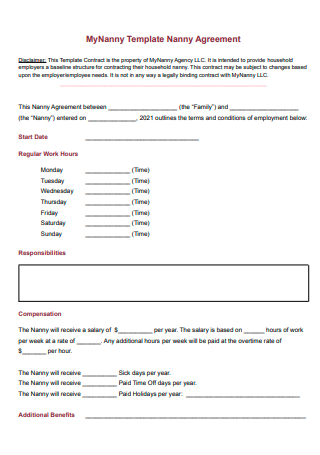
Nanny Agreement Template
download now -
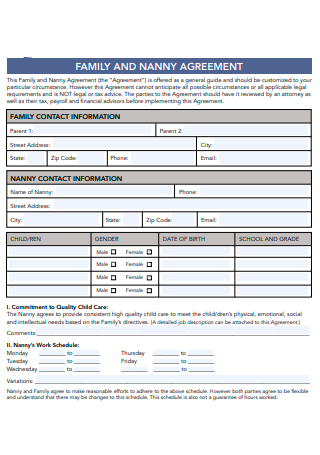
Family and Nanny Agreement
download now -
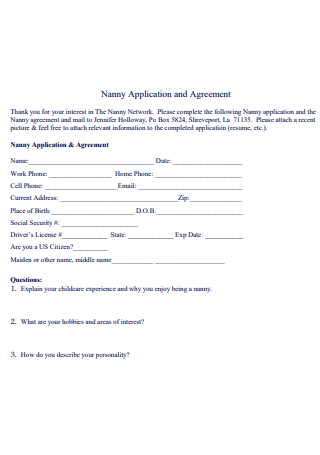
Nanny Application and Agreement
download now -
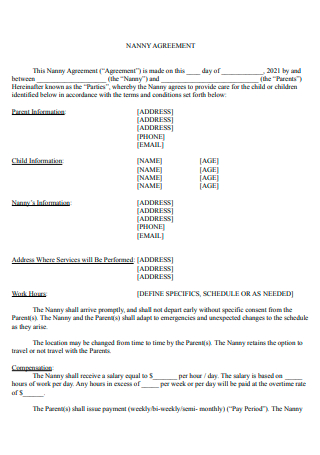
Nanny Agreement Example
download now -
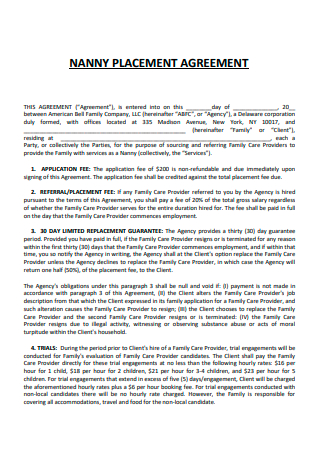
Nanny Placement Agreement
download now -
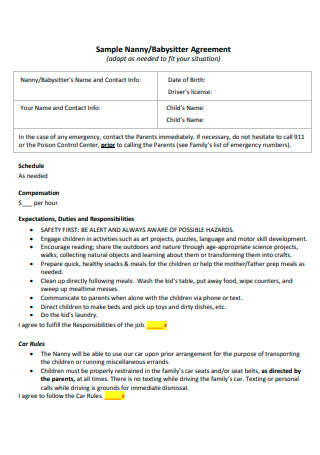
Nanny Babysitter Agreement
download now -
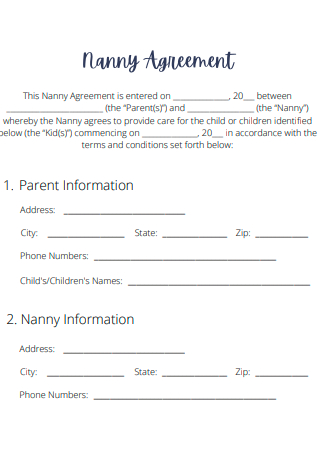
Basic Nanny Agreement
download now -
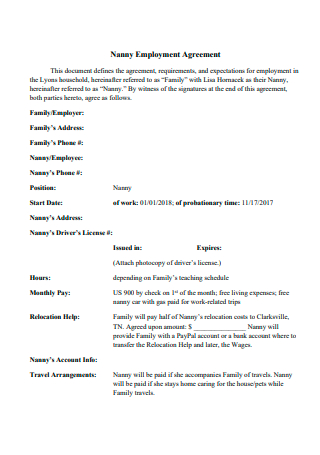
Nanny Employment Agreement
download now -
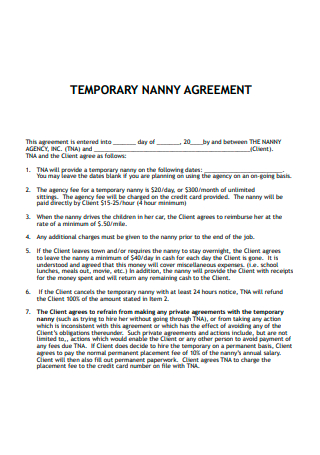
Temporary Nanny Agreement
download now -
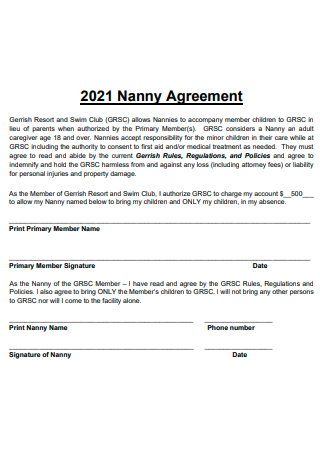
Nanny Agreement in PDF
download now -
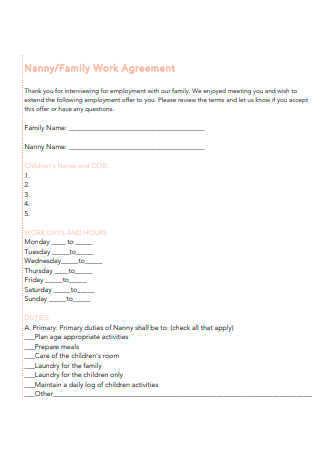
Nanny Family Work Agreement
download now -
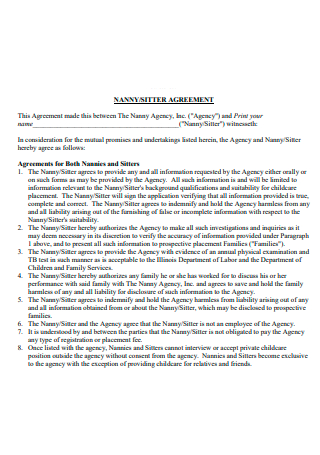
Nanny Sitter Agreement
download now -
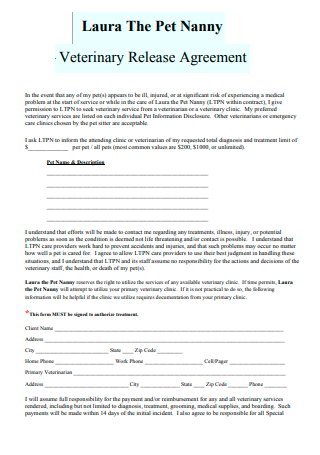
Nanny Veterinary Release Agreement
download now -
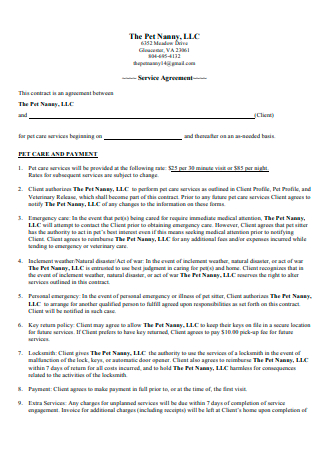
Pet Nanny Service Agreement
download now -
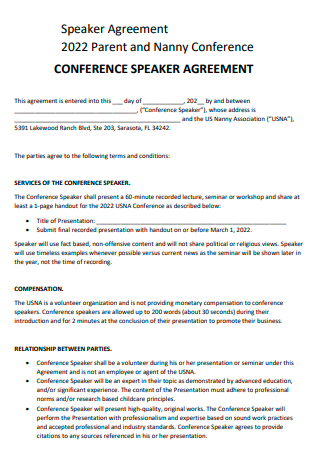
Parent and Nanny Conference Speaker Agreement
download now -
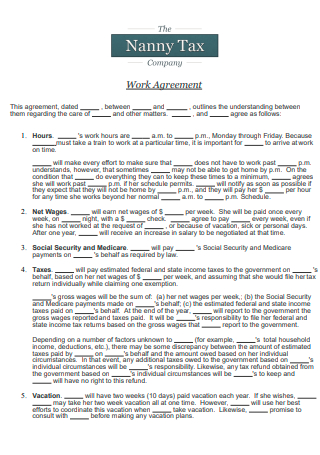
Nanny Tax Work Agreement
download now
What Is a Nanny Agreement?
A nanny agreement is a formal contract between a nanny and a parent or legal guardian. The agreement outlines the terms with regard to the care and supervision of the latter’s children. A nanny can sometimes be referred to as a babysitter, caregiver, or a governess.
According to an online article published by job website Monster, a nanny earns around $12 by the hour, on average. Other rates can go as high as $17 an hour. According to the latest labor statistics, employment in childcare is expected to increase in 2022 by 14%.
Qualities of a Nanny
Taking care of children is an important responsibility. Anyone who is tasked with the formation and supervision of young children ought to possess several qualities. Although there can be many traits and characteristics of a good nanny or caregiver, the following qualities are just some of the most fundamental.
Responsibilities of a Nanny
Depending on the arrangements made between the employer and the nanny, the job of a nanny can cover a broad range of tasks. From simply taking the kids to and from school, to doing laundry, or to teaching them math lessons, the responsibilities can be endless. The following examples below are some traditional and common functions expected of a nanny.
How to Create a Nanny Agreement
To create a complete and coherent nanny agreement, you first need to pinpoint what it is you are looking for in a potential nanny or babysitter. Establishing your needs first will help you determine what kind of agreement to construct. If you are unsure of where to begin, you can easily browse the sample templates above and select one that suits your needs. Once you have chosen a template, follow the basic steps below.
Step 1: Start With an Introduction
Like any basic contract, a nanny agreement should start with a formal introduction. The opening lines or paragraphs of the agreement should contain the main details of the nanny and the employer. The employer can either be the parents, legal guardian, or anyone seeking childcare. The introductory section of the document should not only identify the parties entering into an agreement, but ideally consist of a basic description of the relationship. When drafting the contract, make sure to indicate the complete names of both the nanny and employer. Although optional, you can also include the complete address of either party.
Step 2: Outline the Roles and Responsibilities
Once you have established the identities of both parties, the next step is determining the tasks and functions of the nanny. This section is basically a comprehensive review of the job description. What is the nanny’s primary role upon hiring? What tasks is she or he expected to undertake? These must be enumerated clearly and explicitly so as to avoid any needless confusion. In most cases, a nanny is expected to fill multiple roles, not just play the part of a simple caregiver. Other times, the nanny may be required to cook and tutor the children so it is vital that these core responsibilities be indicated in the formal agreement.
Step 3: Set the Terms and Conditions
Upon finalizing the role and responsibilities of the nanny, you must then set ground rules for the partnership. Even the partnership between a nanny and a parent is considered a working relationship. Not only do nannies have to establish a relationship with the children under their care, but a professional employee-employer relationship should be maintained as well. All transactional or professional partnerships ought to set conditions and boundaries. This section of the agreement is dedicated entirely for defining the terms that will dictate the partnership. Stipulations can refer to a range of items including payment terms, schedule of duties, duration of contract, confidentiality, termination of contract, and other conditions agreed upon by the parties.
Step 4: Formalize the Contract
The last step is confirming the agreement made between the parties involved. In this case, both the nanny and the parent or employer need to affix their signatures to formally seal their agreement. This section of the contract may seem basic and straightforward, but it is vital to any binding promise or agreement. In affixing their signatures, both parties declare that their formal agreement is based on mutual partnership and understanding. In addition to the signatures, the date the document was signed should be indicated as well.
FAQs
Is a nanny contract legally binding?
Technically, yes. If two signatories enter into a formal contract, then yes it is usually binding.
What should go in a nanny contract?
Like any formal contract, a nanny agreement should contain the basic components such as terms, conditions, declarative confirmation statements, and a complete list of duties. It is important to specify the terms and conditions and frame them according to your needs.
How do I make a contract for my nanny?
To create a contract for your nanny, you need a structured format and accurate details. Apart from establishing the identities of each party and outlining the responsibilities of your nanny, you need to ensure that the agreement is direct and comprehensible. If you are short on time and need predesigned agreements, you can easily browse the editable templates above.
A nanny can be of immeasurable help for parents and guardians of young children. To ensure that you and the nanny are getting both what you deserve, it is best to put everything in writing. A formal nanny agreement can help you avoid unnecessary conflict and disagreements. Browse and customize your own contract agreement by downloading a free template now!
